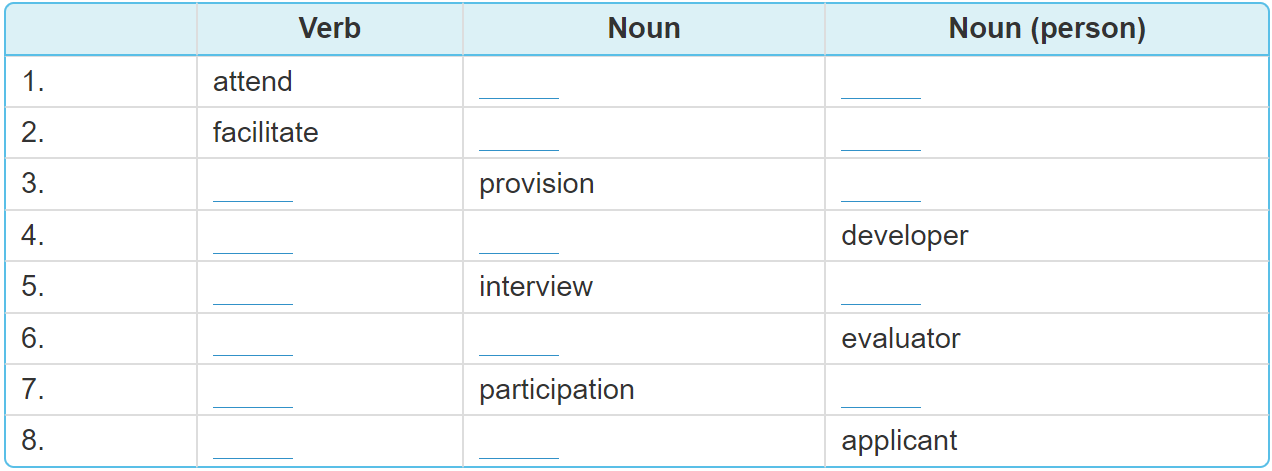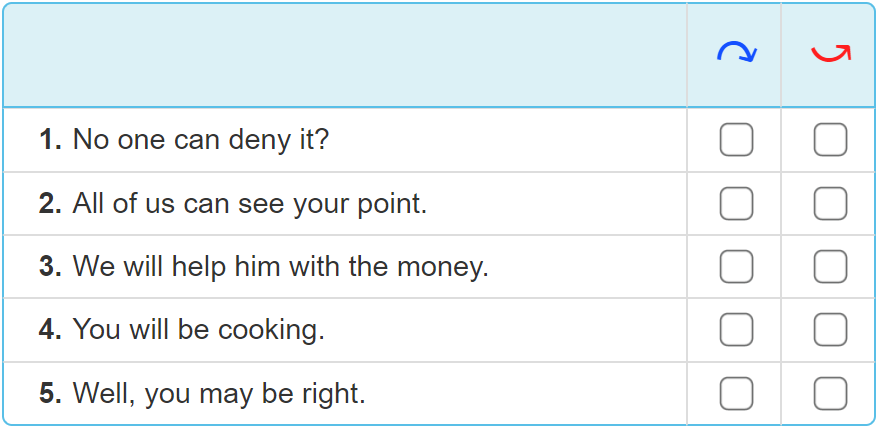Đừng bỏ lỡ những tính năng hấp dẫn của Baitap365.com
Unit 11: Changing Roles In Society - Thay đổi vai trò trong xã hội
A Closer Look 1 Unit 11 trang 61 SGK tiếng Anh 9 mới
A Closer Look 2 Unit 11 trang 62 SGK tiếng Anh 9 mới Communication Unit 11 trang 64 SGK tiếng Anh 9 mới Skills 1 Unit 11 trang 65 SGK tiếng Anh 9 mới Skills 2 Unit 11 trang 67 SGK tiếng Anh 9 mới Looking back Unit 11 trang 68 SGK tiếng Anh 9 mới Project Unit 11 trang 69 SGK tiếng Anh 9 mới Getting Started Unit 11 trang 58 SGK tiếng Anh 9 mới Grammar: The future simple passive - Unit 11 SGK Tiếng Anh 9 mới Grammar: Non-defining relative clause - Unit 11 SGK Tiếng Anh 9 mới Luyện tập từ vựng Unit 11 Tiếng Anh 9 mới Vocabulary - Phần từ vựng - Unit 11 tiếng Anh 9 mớiA Closer Look 1 Unit 11 trang 61 SGK tiếng Anh 9 mới
Use the words in the table in 1 to complete the sentences.
Bài 1
1. Complete the table with appropriate words.
(Hoàn thành bảng với từ thích hợp.)

Bài 2
2. Use the words in the table in 1 to complete the sentences.
(Sử dụng những từ ở bảng 1 để hoàn thành câu.)
1. A lot of people have come tonight to _________ the forum.
2. The application of technology in the school will _________ self-learning.
3. Even in distant areas, the teacher will no longer be the only _________ of knowledge.
4. Who has _________ the idea into this remarkable event?
5. In the programme, he _________ ordinary people about their future plans.
6. The discussion included a critical _________ of the new course.
7. We require your full _________ in this discussion.
8. She decided to _________ for a job as an engineer.
Bài 3
3. Choose the correct answer A, B or C which is closest in meaning to the underlined word/ phrase in the sentences.
(Chọn đáp án đúng A, B, hay C gần nghĩa nhất với từ/ cụm từ gạch chân trong câu.)
1. In the future, fathers may be externally employed or stay at home and look after their children.
(Trong tương lai, các ông bố có thể ra ngoài làm việc hoặc ở nhà chăm sóc các con.)
A. do extra work (làm thêm việc)
B. go out to work (ra ngoài làm việc)
C. work full-time (làm toàn thời gian)
2. There will still be actual classrooms where teachers and students can interact face to face.
(Sẽ vẫn còn những lớp học truyền thống nơi các giáo viên và học sinh có thể tương tác trực tiếp.)
A. virtual (ảo)
B. online (trực tuyến)
C. traditional (truyền thống)
3. The most facinating change happening to women is their increasing involvenment education and employment.
(Sự thay đổi thú vị nhất xảy ra với phụ nữa là tăng sự tham gia vào giáo dục và tuyển dụng.)
A. participation (sự tham gia)
B. roles (vai trò)
C. power (năng lượng)
4. Viet Nam used to be male-dominated, with men being the voice of the family and society.
(Việt Nam đã từng có chế độ trọng nam khinh nữ, đàn ông có tiếng nói trong gia đình và xã hội.)
A. men doing housework (đàn ông làm việc nhà)
B. men playing the leading role (đàn ông đóng vai trò lãnh đạo)
C. men earning money (đàn ông kiếm tiền)
5. Women get a job to support their families as well as to be financially independent.
(Phụ nữ có việc làm để hõ trợ gia đình cũng như độc lập về tài chính.)
A. economically (về kinh tế)
B. physically (về thể chất)
C. totally (toàn bộ)
Bài 4
4. Complete the sentences with phrases formed with ‘sense of’.
(Hoàn thành câu với những cụm từ được hình thành từ " sense of".)
|
sense of humour style responsibility time direction |
1. He has a very good _________. He never gets lost.
2. She has such a good _________. She makes everyone laugh at work.
3. I don't have much _________. I always seem to be late for appointments.
4. He has a strong _________. You can always rely on him.
5. She has no _________ at all. She never chooses the right colour or the right clothes for herself.
Bài 5
5. Listen carefully and tick (✓) the correct box. Then listen again and repeat.
(Nghe cẩn thận và đánh dấu (✓) vào ô đúng. Sau đó nghe lại và lặp lại.)

Bài 6
6. Mark Mike's sentences with falling (agreeing) or rising (disagreeing) arrows. Then listen and check.
(Đánh dấu những câu với mũi tên đi xuống (đồng ý) hay mũi tên đi lên (không đồng ý). Sau đó nghe và kiểm tra.)
Laura: We have to educate the public about wildlife.
(Chúng ta phải giáo dục công khai về động vật hoang dã.)
Mike: Yes, that’s important.
(Vâng, điều đó rất quan trọng.)
Laura: And we must act to save endangered species.
(Và chúng ta phải hành động để cứu những loài nguy cấp.)
Mike: That helps.
(Điều đó sẽ có ích.)
Laura: Keeping wild animals in zoos can help protect them.
(Giữ động vật hoang dã trong vườn thú có thể giúp bảo vệ chúng.)
Mike: That’s an important point …
(Đó là một điểm quan trọng ...)
Laura: Zoos can make money for their conservation programmes through charging entrance fees.
(Vườn thú có thể kiếm tiền cho các chương trình bảo tồn của họ thông qua việc thu phí vào cửa.)
Mike: Umm, yes I suppose so.
(Umm, vâng, tôi cũng nghĩ thế.)
Từ vựng
1.
2.
3.
4.
5.
6.
7.
8.
9.
Mẹo tìm đáp án nhanh
Search Google: "từ khóa + baitap365" Ví dụ: "Bài 5 trang 13 SGK Vật lí 12 baitap365